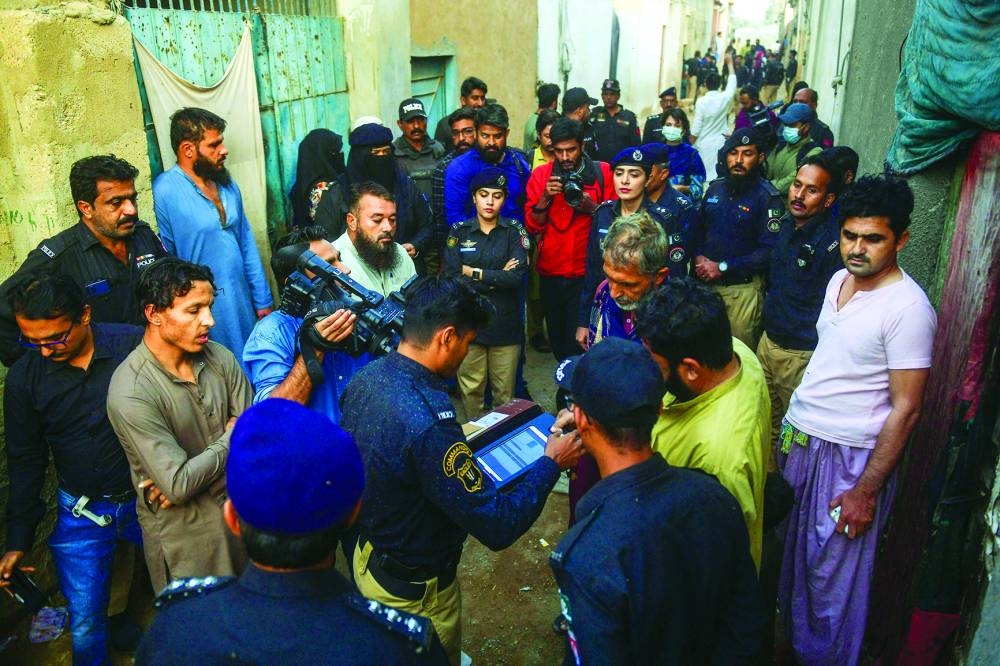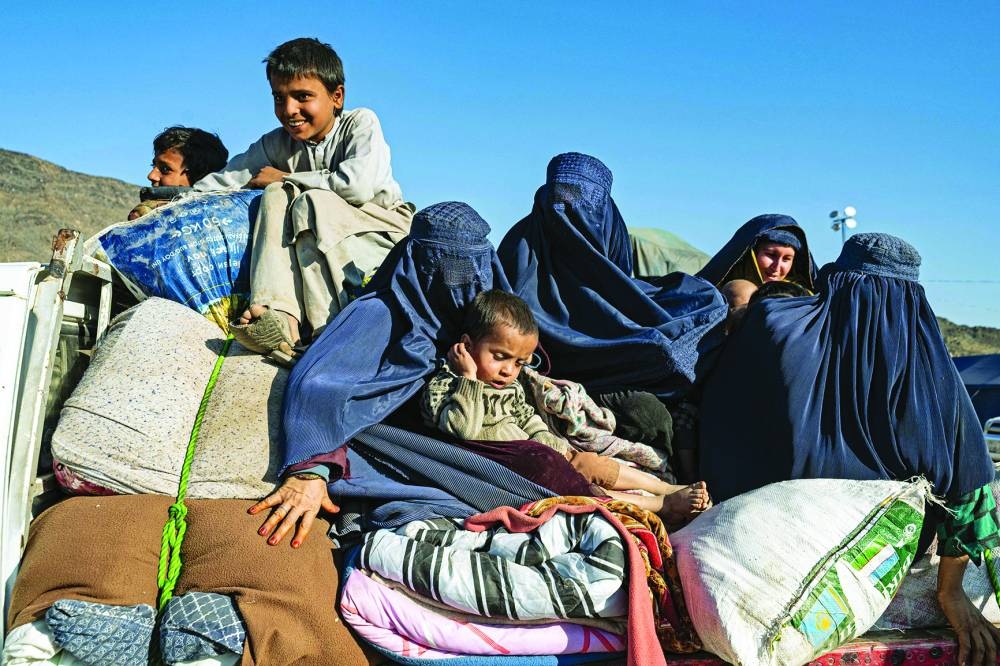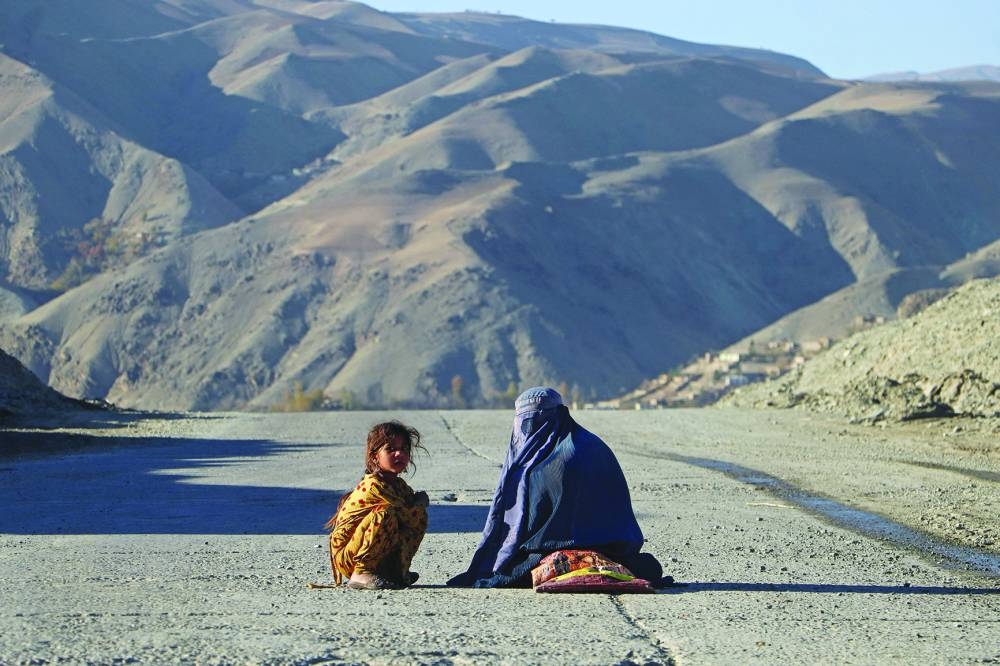Rocked gently on his mother’s knees, a fly on his nose, a baby sleeps fitfully in a tent in a barren border camp as his family prepares to leave the waypoint to rebuild their lives in Afghanistan.
In the transit camp at Torkham, where returnees driven out of Pakistan sweat in burning heat during the day and shiver through the night, many of the blue tents at the foot of rocky mountains standing stark against a cloudless sky have already emptied.
Trucks overloaded with several families, carrying cushions, brightly coloured blankets and kitchen utensils, are readied to set off.
Border officials say that at least 210,000 Afghans, including many who have lived decades, if not their whole lives, outside their country, have passed through the Torkham border point since Pakistan ordered those without documents to leave.
From the reception camp, they have dispersed to various Afghan provinces with a handout of around 15,000 afghanis ($205) – just enough to support a family for a month.
For many, nothing, and no one, awaits them.
“We have nowhere to go, we don’t have a house, or land, I don’t have any work,” said Sher Aga, a former security guard in Pakistan.
He bundled his nine children and all the family’s belongings into a truck to head north, to Kunduz province, where he was born.
However, the 43-year-old has no memory of his homeland, having left Afghanistan when he was five.
“I don’t have any family there anymore,” he told AFP. “My children ask me, ‘What country are we going to?’”
In a tent that she, her husband and their 10 children are sheltering in, 40-year-old Amina hides her face behind a red headscarf.
They are destined for Jalalabad, capital of Nangarhar province where Torkham is located, and where she has “many brothers”.
“I asked my family to find us a house” to rent, she said, “but they say there are none”.
“No one has called us or come to see us,” she added.
In Pakistan, her sons worked selling vegetables or driving rickshaws to pull in enough money to sustain the family, but Amina fears for their prospects in Afghanistan, wracked by economic crisis and unemployment.
“If the boys don’t work, we’re not going to make it.”
Another nearby tent is crammed with the 16 members of Gul Pari’s family, who have been sleeping on cardboard boxes without blankets since arriving at the transit camp.
Her voice is drowned out by the honking of tanker trucks delivering much-needed water to the camp, with clusters of laughing, barefoot children clinging to the back.
The 46-year-old grandmother, her grandchild’s rail-thin body cradled in her lap, said that in five days they will leave for Kunduz to start a new life in a country that she hasn’t seen in four decades.
Life was precarious for the family collecting scraps in Pakistan, but in Afghanistan, “we have nothing”, she said.
“We fear starvation. But if we find work, it’ll be OK. We will be happy in our homeland. In Pakistan, we were being harassed.”
Most of those returning fled an Afghanistan ravaged for decades by deadly conflict, but the end to fighting since the Taliban’s return to power in 2021 has encouraged some to come back.
On the road to Jalalabad, Shazia and 20 other women and children piled into a small truck that leaned precariously as it veered around bends in the road, whipping the women’s blue burqas around a teetering mound of bundles.
Of the Afghans returning from Pakistan, she is luckier than most: her husband went ahead of them to Jalalabad and found a four-room house to rent for four families.
“The rent is expensive,” said the 22-year-old mother-of-three, her youngest child only two months old. “But tonight we will be able to sleep.”
The Taliban’s acting commerce minister has said that he had asked Pakistan to help return the assets of expelled Afghans and discussed ways to overcome Afghanistan’s stalled banking sector transactions during a four-day visit to Islamabad this week.
Acting minister Nooruddin Azizi’s arrival in the Pakistani capital marked the first public visit by a senior Taliban official since Pakistan announced its policy to deport thousands of undocumented Afghans and other foreign citizens after November 1.
It comes just a week after Pakistan’s caretaker prime minister said its expulsion plan was a response to the unwillingness of the Taliban-led administration to act against militants using Afghanistan to carry out attacks in Pakistan.
The Taliban have said the security issues are a domestic matter for Islamabad and called on Pakistan to stop deportations.
Azizi said in an interview with Reuters on Thursday night that the negotiations had mainly focused on trade issues and had been “friendly”.
He said that Pakistan officials had raised counter-terrorism issues and he had reiterated the Taliban’s policy that Afghan soil would not be used against other nations.
Azizi said a major focus of the visit had been raising the problem of Afghan deportees being unable to return their assets from Pakistan.
He said that the Afghan embassy’s charge d’affaires in Islamabad and Pakistan’s foreign office would work on a “detailed roadmap” on how the assets could be returned but said it would take time.
“This is not a matter of 10 people or 100 people, this is a matter of 1.7mn people,” Azizi said.
Afghan citizens returning to Afghanistan have said there are restrictions on the transfer of cash and property from Pakistan, where many had built businesses and homes for decades.

Police personnel test biometrics of Afghan refugees during a search operation to identify alleged illegal immigrants, on the outskirts of Karachi on November 17, 2023. More than 200,000 people have crossed from Pakistan into Afghanistan, Pakistani border officials said, the vast majority since an October ultimatum given to the 1.7 million Afghans Islamabad said were living illegally in the country. (Photo by Asif HASSAN / AFP)

In this photograph taken on November 12, an Afghan mother of three children holds an infant while travelling on a truck to Jalalabad from a makeshift camp near the Afghanistan-Pakistan Torkham border in Afghanistan's Nangarhar province, days after their deportation from Pakistan.

TOPSHOT - An Afghan burqa-clad woman sits beside a girl, as they look for alms along a street in the Fayzabad district of Badakhshan province on November 16, 2023. (Photo by OMER ABRAR / AFP)
